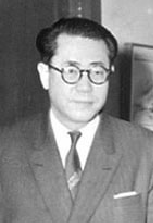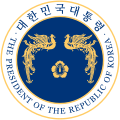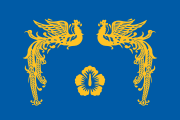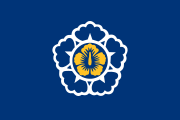Choi Kyu-hah
Choi Kyu-hah (Korean: 최규하; Hanja: 崔圭夏; Korean pronunciation: [tɕʰø.ɡju.ɦa] or [tɕʰø] [kju.ɦa]; July 16, 1919 – October 22, 2006), also spelled Choi Kyu-ha or Choi Gyu-ha, was President of South Korea between 1979 and 1980.
Choi Kyu-hah | |
|---|---|
최규하(崔圭夏) | |
 | |
| 4th President of South Korea | |
| In office October 26, 1979 – August 16, 1980 Acting to December 6, 1979 | |
| Prime Minister | Shin Hyun-hwak Park Choong-hoon |
| Preceded by | Park Chung-hee |
| Succeeded by | Chun Doo-hwan |
| Prime Minister of South Korea | |
| In office December 18, 1975 – December 12, 1979 | |
| President | Park Chung-hee |
| Preceded by | Kim Jong-pil |
| Succeeded by | Shin Hyun-hwak |
| Personal details | |
| Born | July 16, 1919 Wonju-myeon, Wonju County, Gangwon, Japanese Korea |
| Died | October 22, 2006 (aged 87) Mapo-gu, Seoul, South Korea |
| Resting place | Daejeon National Cemetery |
| Nationality | South Korean |
| Political party | Independent |
| Spouse(s) | Hong Gi ( m. 1935) |
| Alma mater | University of Tsukuba |
| Signature | .svg.png) |
| Korean name | |
| Hangul | |
| Hanja | |
| Revised Romanization | Choe Gyu-ha |
| McCune–Reischauer | Ch'oe Kyuha |
| Pen name | |
| Hangul | |
| Hanja | |
| Revised Romanization | Hyeonseok |
| McCune–Reischauer | Hyŏnsŏk |
| Courtesy name | |
| Hangul | |
| Hanja | |
| Revised Romanization | Seook |
| McCune–Reischauer | Sŏok |
Early life
Choi was born in Wonju, Gangwon Province when Korea was a part of the Empire of Japan. This area today is in South Korea.
Political career
Choi served as Ambassador to Malaysia from 1964 to 1967, foreign minister from 1967 to 1971; and as prime minister from 1975 to 1979.
After the assassination of Park Chung-hee in 1979, Choi became acting president; the prime minister stood next in line for the presidency under Article 48 of the Yushin Constitution. Due to the unrest resulting from Park's authoritarian rule, Choi promised democratic elections, as under Park elections had been widely seen as rigged. Choi also promised a new constitution to replace the highly authoritarian Yushin Constitution. Choi was the sole candidate in an election on 6 December for the balance of Park's term, becoming the country's fourth president.
Coup d'etat and forced resignation
In December 1979, Major General Chun Doo-hwan and close allies within the military staged a coup d'état against Choi's government. They quickly removed the army chief of staff and virtually controlled the government by early 1980.
In April 1980, due to increasing pressure from Chun and other politicians, Choi appointed Chun head of the Korean Central Intelligence Agency. In May, Chun declared martial law and dropped all pretense of civilian government, becoming the de facto ruler of the country. By then, student protests were escalating in Seoul and Gwangju. The protests in Gwangju resulted in the Gwangju uprising in which about 987 civilians were killed within a five-day period by Chun's military.
Choi was forced to resign soon after the uprising. Prime Minister Park Chung-hoon became acting president, until Chun's election as President on September 1, 1980.
Later life
After his resignation, Choi lived quietly out of the public eye and died on October 22, 2006. Choi was buried in Daejeon National Cemetery on October 26, 2006.[1]
See also
- Index of Korea-related articles
- Gangneung Choi clan
References
- "Daejeon National Cemetery Timeline". Daejeon National Cemetery. Retrieved 28 September 2014.
External links
- President Choi Kyu-ha
- Nils M. Solsvik Jr. (Oct 23, 2006). "Choi Kyu-hah". South Korean President. Find a Grave. Retrieved Aug 19, 2011.
| Political offices | ||
|---|---|---|
| Preceded by Park Chung-hee |
President of South Korea October 26, 1979–August 16, 1980 |
Succeeded by Chun Doo-hwan |
| Preceded by Kim Jong-pil |
Prime Minister of South Korea December 18, 1975–October 26, 1979 |
Succeeded by Shin Hyun-hwak |



